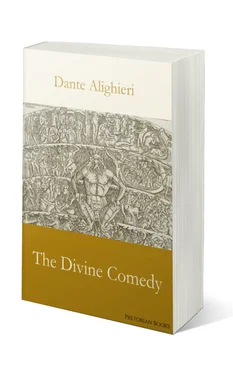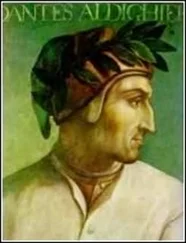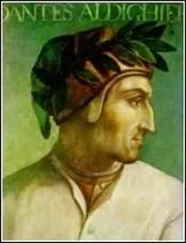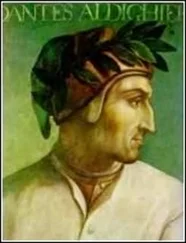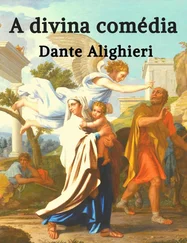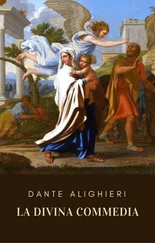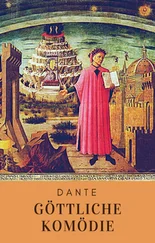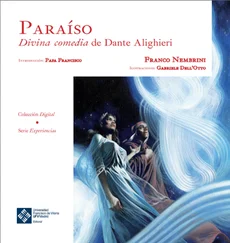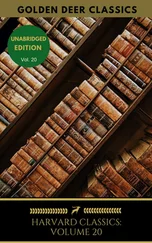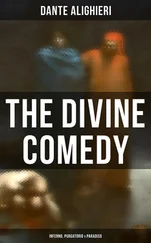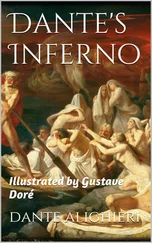One hammers at the prow, one at the poop;
This shapeth oars, that other cables twirls,
The mizen one repairs and main-sail rent
So not by force of fire but art divine
Boil'd here a glutinous thick mass, that round
Lim'd all the shore beneath. I that beheld,
But therein nought distinguish'd, save the surge,
Rais'd by the boiling, in one mighty swell
Heave, and by turns subsiding and fall. While there
I fix'd my ken below, "Mark! mark!" my guide
Exclaiming, drew me towards him from the place,
Wherein I stood. I turn'd myself as one,
Impatient to behold that which beheld
He needs must shun, whom sudden fear unmans,
That he his flight delays not for the view.
Behind me I discern'd a devil black,
That running, up advanc'd along the rock.
Ah! what fierce cruelty his look bespake!
In act how bitter did he seem, with wings
Buoyant outstretch'd and feet of nimblest tread!
His shoulder proudly eminent and sharp
Was with a sinner charg'd; by either haunch
He held him, the foot's sinew griping fast.
"Ye of our bridge!" he cried, "keen-talon'd fiends!
Lo! one of Santa Zita's elders! Him
Whelm ye beneath, while I return for more.
That land hath store of such. All men are there,
Except Bonturo, barterers: of 'no'
For lucre there an 'aye' is quickly made."
Him dashing down, o'er the rough rock he turn'd,
Nor ever after thief a mastiff loos'd
Sped with like eager haste. That other sank
And forthwith writhing to the surface rose.
But those dark demons, shrouded by the bridge,
Cried "Here the hallow'd visage saves not: here
Is other swimming than in Serchio's wave.
Wherefore if thou desire we rend thee not,
Take heed thou mount not o'er the pitch." This said,
They grappled him with more than hundred hooks,
And shouted: "Cover'd thou must sport thee here;
So, if thou canst, in secret mayst thou filch."
E'en thus the cook bestirs him, with his grooms,
To thrust the flesh into the caldron down
With flesh-hooks, that it float not on the top.
Me then my guide bespake: "Lest they descry,
That thou art here, behind a craggy rock
Bend low and screen thee; and whate'er of force
Be offer'd me, or insult, fear thou not:
For I am well advis'd, who have been erst
In the like fray." Beyond the bridge's head
Therewith he pass'd, and reaching the sixth pier,
Behov'd him then a forehead terror-proof.
With storm and fury, as when dogs rush forth
Upon the poor man's back, who suddenly
From whence he standeth makes his suit; so rush'd
Those from beneath the arch, and against him
Their weapons all they pointed. He aloud:
"Be none of you outrageous: ere your time
Dare seize me, come forth from amongst you one,
"Who having heard my words, decide he then
If he shall tear these limbs." They shouted loud,
"Go, Malacoda!" Whereat one advanc'd,
The others standing firm, and as he came,
"What may this turn avail him?" he exclaim'd.
"Believ'st thou, Malacoda! I had come
Thus far from all your skirmishing secure,"
My teacher answered, "without will divine
And destiny propitious? Pass we then
For so Heaven's pleasure is, that I should lead
Another through this savage wilderness."
Forthwith so fell his pride, that he let drop
The instrument of torture at his feet,
And to the rest exclaim'd: "We have no power
To strike him." Then to me my guide: "O thou!
Who on the bridge among the crags dost sit
Low crouching, safely now to me return."
I rose, and towards him moved with speed: the fiends
Meantime all forward drew: me terror seiz'd
Lest they should break the compact they had made.
Thus issuing from Caprona, once I saw
Th' infantry dreading, lest his covenant
The foe should break; so close he hemm'd them round.
I to my leader's side adher'd, mine eyes
With fixt and motionless observance bent
On their unkindly visage. They their hooks
Protruding, one the other thus bespake:
"Wilt thou I touch him on the hip?" To whom
Was answer'd: "Even so; nor miss thy aim."
But he, who was in conf'rence with my guide,
Turn'd rapid round, and thus the demon spake:
"Stay, stay thee, Scarmiglione!" Then to us
He added: "Further footing to your step
This rock affords not, shiver'd to the base
Of the sixth arch. But would you still proceed,
Up by this cavern go: not distant far,
Another rock will yield you passage safe.
Yesterday, later by five hours than now,
Twelve hundred threescore years and six had fill'd
The circuit of their course, since here the way
Was broken. Thitherward I straight dispatch
Certain of these my scouts, who shall espy
If any on the surface bask. With them
Go ye: for ye shall find them nothing fell.
Come Alichino forth," with that he cried,
"And Calcabrina, and Cagnazzo thou!
The troop of ten let Barbariccia lead.
With Libicocco Draghinazzo haste,
Fang'd Ciriatto, Grafflacane fierce,
And Farfarello, and mad Rubicant.
Search ye around the bubbling tar. For these,
In safety lead them, where the other crag
Uninterrupted traverses the dens."
I then: "O master! what a sight is there!
Ah! without escort, journey we alone,
Which, if thou know the way, I covet not.
Unless thy prudence fail thee, dost not mark
How they do gnarl upon us, and their scowl
Threatens us present tortures?" He replied:
"I charge thee fear not: let them, as they will,
Gnarl on: 't is but in token of their spite
Against the souls, who mourn in torment steep'd."
To leftward o'er the pier they turn'd; but each
Had first between his teeth prest close the tongue,
Toward their leader for a signal looking,
Which he with sound obscene triumphant gave.
IT hath been heretofore my chance to see
Horsemen with martial order shifting camp,
To onset sallying, or in muster rang'd,
Or in retreat sometimes outstretch'd for flight;
Light-armed squadrons and fleet foragers
Scouring thy plains, Arezzo! have I seen,
And clashing tournaments, and tilting jousts,
Now with the sound of trumpets, now of bells,
Tabors, or signals made from castled heights,
And with inventions multiform, our own,
Or introduc'd from foreign land; but ne'er
To such a strange recorder I beheld,
In evolution moving, horse nor foot,
Nor ship, that tack'd by sign from land or star.
With the ten demons on our way we went;
Ah fearful company! but in the church
With saints, with gluttons at the tavern's mess.
Still earnest on the pitch I gaz'd, to mark
All things whate'er the chasm contain'd, and those
Who burn'd within. As dolphins, that, in sign
To mariners, heave high their arched backs,
That thence forewarn'd they may advise to save
Their threaten'd vessels; so, at intervals,
To ease the pain his back some sinner show'd,
Then hid more nimbly than the lightning glance.
E'en as the frogs, that of a wat'ry moat
Stand at the brink, with the jaws only out,
Their feet and of the trunk all else concealed,
Thus on each part the sinners stood, but soon
As Barbariccia was at hand, so they
Drew back under the wave. I saw, and yet
My heart doth stagger, one, that waited thus,
As it befalls that oft one frog remains,
While the next springs away: and Graffiacan,
Who of the fiends was nearest, grappling seiz'd
His clotted locks, and dragg'd him sprawling up,
Читать дальше
